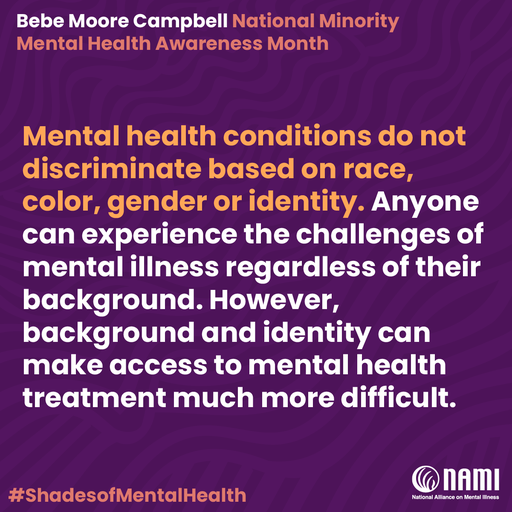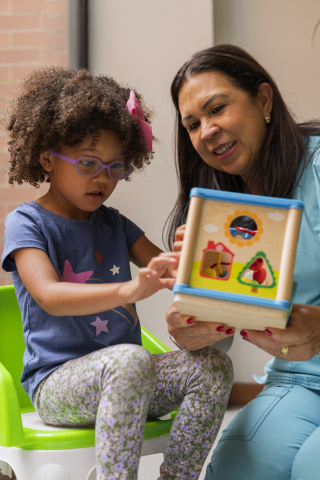
National Minority Mental Health Awareness Month
NICHQ recognizes July as National Minority Mental Health Awareness Month — a month dedicated to awareness, advocacy and support for BIPOC with mental health conditions and the challenges they face to access quality mental health services. By listening to people from systematically minoritized communities and approaching our quality improvement efforts with an equity lens, we can work to improve mental health outcomes for children and their caregivers.
Bebe Moore Campbell National Minority Mental Health Awareness Month was establis hed in 2008 to improve access to mental health treatment and services and enhance public awareness of mental illness among minorities.
hed in 2008 to improve access to mental health treatment and services and enhance public awareness of mental illness among minorities.
This year, the National Alliance of Mental Health is amplifying the message, #ShadesofMentalHealth, to recognize and celebrate the rich diversity and uniqueness within the mental health community. It encourages inclusivity, empathy, and understanding while striving for more equitable and culturally competent approaches to mental health support and care.
Support BIPOC Living with Mental Health Conditions
As public health professionals and care providers, it's important to support BIPOC in achieving their optimal mental health by ensuring equal access to quality mental health services and amplifying the voices of people from historically excluded communities. Looking for more resources? We hope you find these insights, tools, and resources to be helpful.

Support Caregivers Experiencing Depression
Despite the prevalence of maternal depression, too many mothers and birthing people don’t get the help they need to heal. And when mothers' health suffers, their children's health often suffers, too.
- Physicians, public health providers, policymakers, families, and community advocates can take action and drive change to improve the mental health of mothers and birthing people. This webinar discusses strategies for improving access to maternal depression screenings and interventions.
- Research suggests that the risk of postpartum depression is nearly 40% higher in Latina women than in white women. Community organizations, public health professionals, providers, and other healthcare workers can use the new Spanish Healthy Start perinatal depression brochures to reach more communities.
- Listen to a candid conversation with Meera Menon, Ph.D., NICHQ Associate Director of Applied Research and Evaluation, about maternal mental health and gaps in support.
NICHQ's Commitment to Equity
Health in the U.S. is not equitable. Not everyone has access to healthcare, especially healthcare that is culturally relevant and free from bias. Because not everyone has equal opportunity to access the resources needed for health and well-being, including mental health, disparities are pervasive from the earliest years of life. Learn more about NICHQ's commitment to achieving equity in all forms.

Building Strength & Resiliency in Children
Mental health in childhood involves reaching developmental and emotional milestones, learning healthy social skills, and understanding how to cope when there are problems.
- Stressful events during childhood can have a negative impact across the lifespan. Promoting protective buffers is a vital way for public health professionals, health care providers, families, and policymakers to help more children have a healthy future. Learn more.
- Strong early social and emotional development gives children the building blocks for lifelong mental health. Pediatric care professionals can help children build this foundation by fostering social and emotional development. Learn more.

